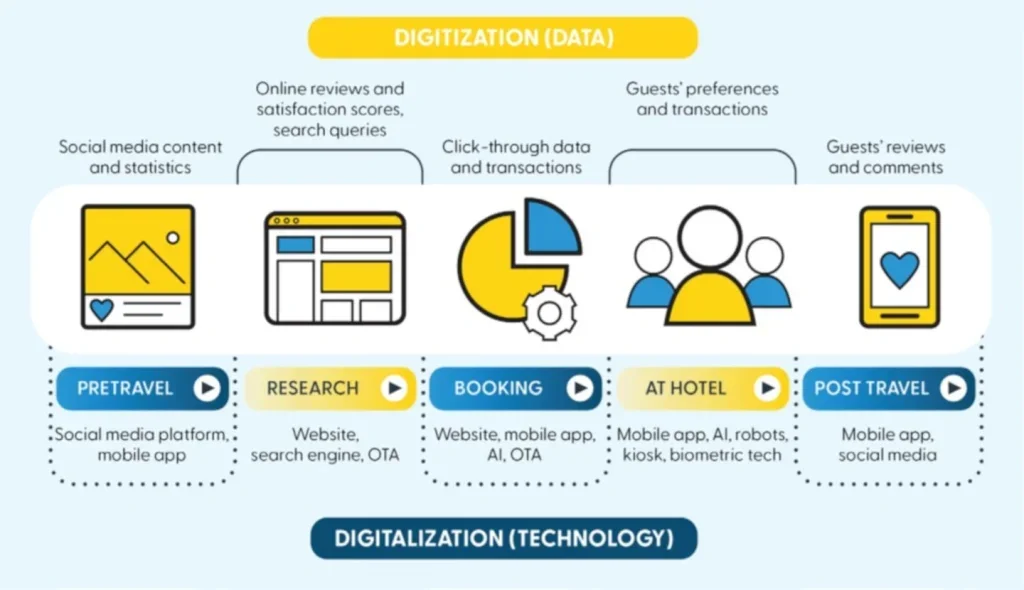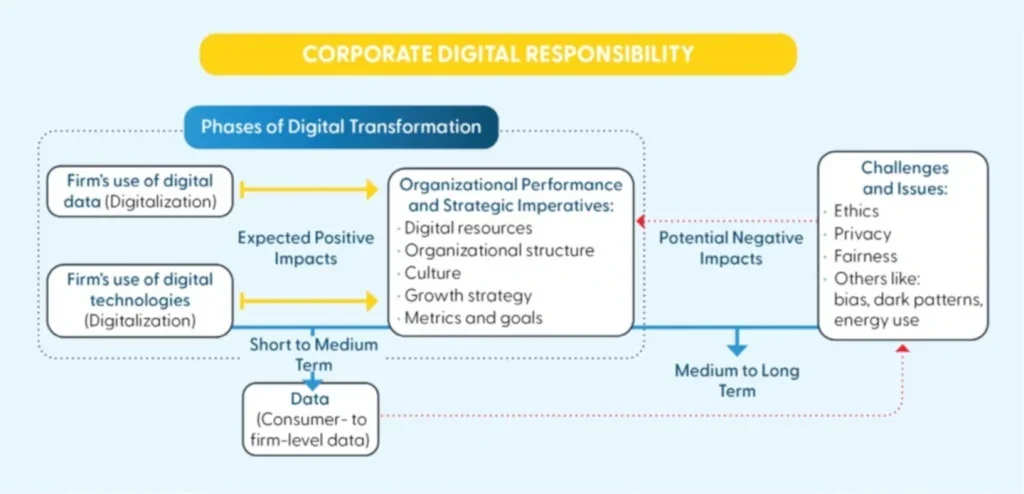Due to the rapid development of information and communication technologies (ICT), hospitality organisations have been implementing various technology-driven services (chatbot, robots or AI, for example) for customers. They also have deployed internal and external information systems for operations, management, forecasting and analytics involving digitisation, digitalisation and digital transformation, necessitating the need for corporate digital responsibility (CDR).
Let’s look at this trio – digitisation, digitalisation, and digital transformation – using the guest cycle in the hotel industry (see Figure 1). This cycle starts when someone, on the guest’s side, decides to travel. On the hotel side, businesses deploy marketing efforts via emails, websites or social media. Both the guests and the hotels leave a digital footprint.
Figure 1: Digitisation and digitalisation in the hotel guest cycle

Through the guest cycle, digitisation converts analogue data from both the guest and the hotel into digital form. Simultaneously, digitalisation occurs through the use of ICT devices and information systems where data is generated and collected. Finally, digital transformation takes place when a hotel integrates digital technology and data, connects digital capabilities such as AI, machine learning, or business analytics to the hotel’s strategic goals to then guide business decisions.
The need for CDR
In the paths of all these stages to reach digital transformation there are a number of challenges; but of all, data security is paramount. From the guests, a hotel gathers and stores data on guests’ spending and purchase preferences. From the backof- the-house, a hotel has systems in scheduling, payroll, reservation, energy management, for example, collecting data points from both guests and employees. Machine learning (ML), business analytics and AI are tools used in data analysis.
All these tools make our hospitality management systems, from online booking, point of sales systems, and property management systems, smarter. When used properly, AI can be designed to identify loopholes and fake information; however, AI can also cause discrimination and other negative issues. Then, how is such data being kept, used, and managed in a sustainable and responsible manner?
These are all CDR issues (see Figure 2). CDR is a set of shared practices that dictates how a business should behave in their use of data and digital technologies, manage their digital footprint and data security so as to be ethically, socially and environmentally responsible for all. With data being captured in text, images, numbers and knowing hotels use financial data to gauge performance, set strategies and co-create with their guests to ensure personalised services to increase guest satisfaction, CDR in hotels is of special concern and utmost importance. And if a hotel does not have any guidelines, code of conduct, and proper CDR practices in managing digital data and technology sustainably, this can spell disasters down the road.
The challenges
First, when data is involved, there are always privacy and security issues. Data breaches can be in the form of phishing, ransomware and even human error, and such breaches know no boundaries. They attack big and small companies, international and local. The data breach at Sabre Hospitality Solutions in 2017 as a third-party reservation system affected multiple hotel companies. The negative results can be as benign as unwanted marketing communications, but they can also lead to more serious issues such as identity theft.
Second, there are fairness and bias issues. From sampling biases, representation and aggregation of data, or even programming one’s social biases in the algorithms, AI can be inaccurate and dangerous. Businesses that use data extensively deal with an inordinate amount of data about their guests and employees. Analytics are run and ML is used, models are trained to optimise results to increase value, leading to efficiency.
Figure 2: Digital transformation necessitates the need for CDR

This is customisation, co-creation and personalisation so that our industry can tout what we do for our guests. On the flip side, these ML and algorithm training processes continuously receive new data and make new inferences. AI learns on its own, with the data it has, to the point that AI developers may not truly understand why certain results are generated, and this can be risky.
Third, there is also the issue of dark patterns. Dark patterns are deceptions found in user interfaces to trick consumers to carry out unintended purchases or to give their personal data. In 2019, the 116th Congress introduced the Deception Experiences To Online Users Reduction (DETOUR) Act, and again it was reintroduced in 2023. Dark patterns are used widely by online travel agency (OTA) websites where false discount claims are advertised, and other guest purchases are falsified to create the bandwagon effect. Although this is an example on OTAs, they are so closely related to the hotel industry that as hotel companies, we need to be more vigilant. And that is another reason why CDR is important.
Data code of conduct
Undoubtedly, for major brands, with their available infrastructure, they practice some level of CDR. Yet, there is not a shared goal in the industry. And all companies, big and small, can always benefit from a quick check. When deciding what data to collect and how to collect them, it is wise to also establish that internal data code of conduct simultaneously. A code is less stringent than an entire CDR plan, but it is a very good place to start. Some might discount the effectiveness of a code of conduct as merely self-regulation without enforcement, that is nonbinding, and has no legal repercussions discuss at length regarding a code of conduct for e-commerce stemming from CDR. Many of the comments can also be applied to hotels.
A code can work. Take for example the Uniform System of Accounts for the Lodging Industry (USALI). It is a document, not regulations, or laws. Hotel companies can choose to abide by following the USALI way of reporting when compiling their accounting work. When a code is fair, sensible, and includes ethical standards and principles, others will see the good and follow. This is self-regulation. In this case, many hotel management agreements include the stipulation of using the USALI to report the financial results. As such, the owners and the management companies are self-governing with the management contract as the adjudication entity. This can be the same for the data code of conduct.
A win
As with any issue, planning is the key. Benjamin Franklin said, “By failing to prepare, you are preparing to fail.” So, let’s prepare by first setting a data code of conduct for the hotel industry so we can stay in the forefront in this new era of responsible digital transformation.
Hospitality Financial and Technology Professionals (HFTP), the global spokes group for the industry’s hospitality technology segment and producers of the HITEC brand, has adopted the project to develop a Hospitality Code of Digital Responsibility. A task force of industry experts and academics was convened, and the first of a series of task force meetings was held at HITEC North America 2024 in Charlotte, North Carolina, US. Once a draft code is developed, it will be presented for industry feedback. Ultimately, a final code will be developed and hospitality enterprises who opt to follow the base guidelines will be awarded a compliance seal. The target date for release of the guidelines is Q4 2024.






